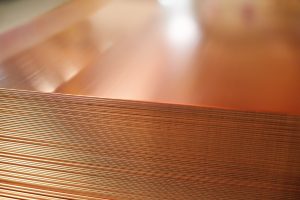When creating an easily machinable Copper alloy, adding Sulphur to pure copper produces a ‘free machining copper’ as the Sulphur acts as a chip breaker. This makes it far easier to machine than pure copper whilst only having a minor effect on the conductivity of the metal. As part of our extensive Copper range at Prestige Metal Supplies, we stock high-quality Sulphur Copper in Grade CW114C. This is a free-machining Copper with an approximately 80% machinability rating. Some of the benefits of using Sulphur Copper are that machining speeds can reach up to 4 times faster than those of pure Copper and a greater tooling life span is also seen when using Sulphur Copper over pure Copper.
As an extremely versatile metal, Sulphur Copper combines impressive thermal and electrical conductivity values usually only seen in pure Copper with the ease of machining coming from the sulphur. This allows for it to be used in a much greater variety of circumstances. Other qualities of CW114C are easy solder ability and high levels of corrosion resistance.
Our CW114C Sulphur Copper at Prestige Metal Supplies is readily available in a number of different formations, including Sulphur Copper plate or Sulphur Copper bar in a range of shapes. Our team will be happy to discuss our extensive range with you in further detail if you are unsure of the exact product you require for your project.

Key Features of Sulphur Copper (CW114C)
The main features and characteristics of sulphur copper make it widely used in applications where machinability and corrosion resistance are essential. The Key features of CW114C sulphur copper include:
- Good thermal conductivity
- Excellent machinability due to the presence of sulphur
- Good corrosion resistance
- Excellent electrical conductivity
- Not susceptible to hydrogen embrittlement
- Can be easily cold worked and formed into various shapes
We are proud to source all of our sulphur copper from trusted UK and European suppliers to ensure our customers only receive the highest-quality stock that meets and exceeds all industry standards. To find out more about our range of Sulphur Copper, contact Prestige Metal Supplies now.
Melting Point – 1079°C
Density – 8.94 g/cm³
Specific heat – 385 J/Kg °K
Thermal conductivity – 347 W/m°K
Thermal expansion coefficient (20-200°C) – 17 x 10-6per °C
Electrical conductivity – 93% IACS
Electrical resistivity – 0.0181 microhm m
Modulus of elasticity – 12500 Kg/mm²
Sulphur Copper C111 is used in a wide range of industries and sectors for an array of applications including:
- Electrical contacts
- Circuit breaker terminals
- Clamps
- Gas valve nozzles
- Screws, nuts and fasteners
Hot Working Temperature Range – 750-870°C
Hot Formability – Good
Cold Formability – Good
Cold reduction between anneals – 70% max.
Machinability rating (free cutting brass = 100) – 80
Copper – Rem
Sulphur – 0.2–0.7%
Phosphorus – 0.003-0.012%
Total Imps – 0.1% max
Soldering – Excellent
Brazing – Good
Oxy-acetylene welding – Not Recommended
Gas-shielded arc welding – Not Recommended
Resistance welding: Spot and Seam – Not Recommended
Butt – Fair
FAQs
What is Sulphur Copper?
Sulphur Copper is created when Sulphur is added to a standard Copper. Pure Copper has excellent thermal and electrical conductivity, as well as great corrosion resistance and ductility. However, the metal has poor machinability. When Sulphur is introduced to Copper, the workability of the metal significantly increases without having to compromise on the highly beneficial and prized properties of pure Copper. Pure Copper typically has a machinability rating of 20%. When we compare this to Sulphur Copper, the latter has an excellent 80% machinability rating in contrast. Sulphur Copper typically has machining speeds that are around four times faster than pure Copper and since the compound produces a much softer metal, it is less detrimental on tooling and machining components.
What is Sulphur Copper Used for?
Sulphur Copper is commonly used in applications that require a high level of corrosion resistance as well as excellent thermal and electrical conductivity. It is also required for applications that demand easy forming and extensive machining which pure Copper is unable to handle. Sulphur Copper is commonly used in the following, among other uses:
- Circuit Breakers
- Electrical Connectors
- Socket Connectors
- Laser Nozzles
- Transistor Bases
- Relay Parts
- Electrical Pins
